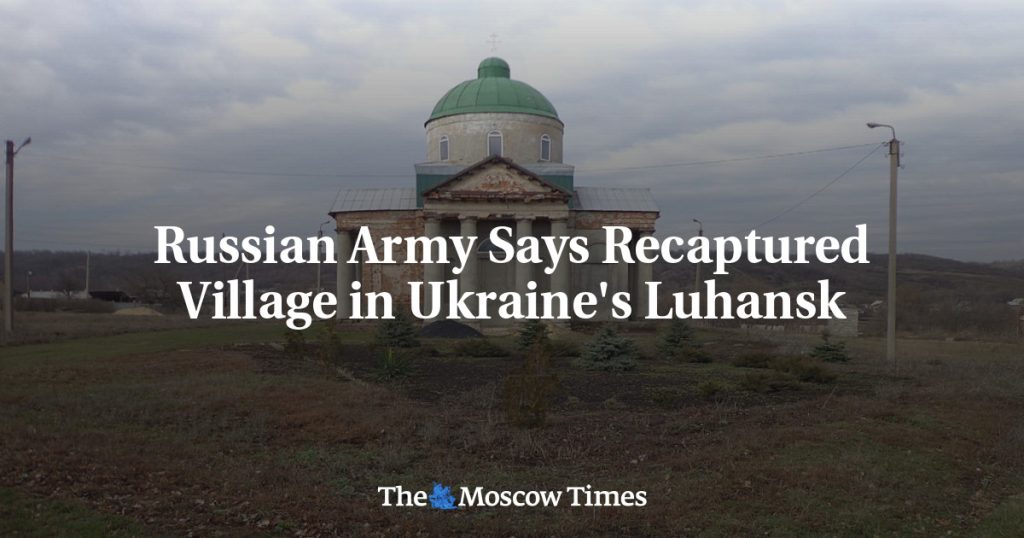Russia announced on Wednesday that its forces had retaken the village of Klishchiivka in eastern Ukraine, reversing the gains made by Ukraine during its counteroffensive last summer. The Russian Defense Ministry reported that units of the Southern grouping of troops were responsible for liberating the village in the Donetsk region. Klishchiivka, which lies south of the key frontline city of Bakhmut, had previously been captured by Russian troops in January 2023, only to be reclaimed by Ukraine in September. The population of the village was around 500 people prior to Russia’s full-scale invasion in February 2022. There was no immediate comment from Kyiv regarding Moscow’s capture claim.
Russian forces have been making significant gains in northeastern Ukraine’s Kharkiv region, taking advantage of Ukraine’s manpower shortages and delays in critical military aid from the United States. The Ukrainian army has faced intense pressure over the past two weeks, leading to the reallocation of resources and manpower to areas where Russia is spearheading its offensive. Moscow recently announced that it had captured the Ukrainian stronghold of Bilogorivka, a key step towards gaining control of the eastern Luhansk region. The ongoing conflict between Russia and Ukraine continues to evolve, with Russian forces gaining ground and putting pressure on Ukrainian defenses.
The situation in Ukraine has drawn international attention as the conflict intensifies between Russian and Ukrainian forces. The capture of Klishchiivka and other strategic locations by Russian troops highlights the shifting dynamics on the ground and the challenges faced by Ukraine in defending its territory. The Ukrainian army’s stretched resources and manpower shortages have made it difficult to withstand the Russian offensive, leading to concerns about the overall security and stability in the region. The ongoing conflict underscores the complexity of the situation and the urgent need for diplomatic efforts to bring about a peaceful resolution.
The Moscow Times, an independent news source that has been operating for over 30 years, has been labeled as a “foreign agent” by the Russian government, threatening its ability to provide accurate and unbiased reporting on Russia. Despite this branding, the journalists of The Moscow Times remain committed to their mission of delivering reliable news and information to the public. The publication is calling on its readers for support to continue their vital work in the face of government censorship and attempts to silence independent voices. The ongoing efforts to suppress independent journalism in Russia underscore the challenges faced by media outlets in maintaining their integrity and serving the public interest.
The conflict between Russia and Ukraine has had far-reaching consequences, with implications for regional security and global stability. The continued fighting and territorial gains by Russian forces demonstrate the escalating nature of the conflict and the humanitarian concerns it raises. The international community has been closely monitoring the situation, with calls for de-escalation and diplomatic solutions to end the violence and protect civilian populations. The need for a peaceful resolution to the conflict in Ukraine remains paramount, with ongoing diplomatic efforts aimed at finding a way forward and addressing the root causes of the crisis.
As the conflict in Ukraine continues to evolve, the challenges faced by the Ukrainian army and the broader implications of the conflict for regional and global security are becoming increasingly apparent. The gains made by Russian forces in recent weeks highlight the shifting power dynamics on the ground and the urgent need for international intervention to prevent further escalation of the conflict. The ongoing support for independent journalism in the face of government censorship serves as a reminder of the importance of a free press in holding power to account and ensuring that the public has access to accurate and unbiased information. The situation in Ukraine remains fluid, with the need for a peaceful resolution and a commitment to upholding international norms and human rights at the forefront of efforts to address the crisis.


